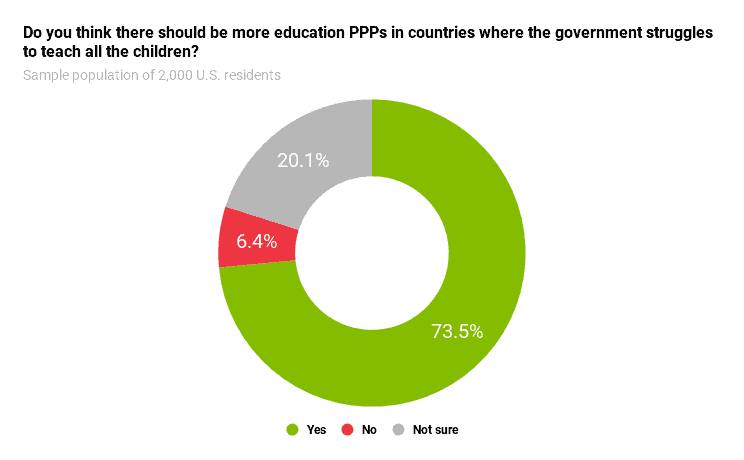The public support education public private partnerships
Research conducted in 2018 reveals that people around the world think there should be more partnerships to help address the global shortage of learning.
Looking at new polling, adults in the USA and the UK agree with international experts and organisations that the private sector should be supporting the public sector to deliver more high quality education opportunities for children in countries where there are not enough schools.
Thousands of people in the USA and the UK have fed into the new research that sought to discover what civil society really thinks about the provision of education in low and middle-income countries. People across the political spectrum and from a wide range of States and Counties made their voices heard. Of course, when asked, people put the needs of children first, saying that mechanisms like PPPs are a good idea if it means more children getting a proper education.
Seventy-five percent of US adults surveyed expressed support for education public private partnerships to help countries struggling with sufficient access to education. The majority of UK respondents also agreed.

These findings are complementary to those released by The Varkey Foundation, which conducted similar research among parents all around the world to discover wide ranging support for the private sector in education. For example, in their survey 73% of Indian parents supported the idea of a private company running a free to attend school. In Kenya it was 72% and Uganda 65%.
Why are these partnerships needed in places like sub-Saharan Africa? According to independent academic research led by Associate Professor Tessa Bold, the region can be characterised by saying there are no adequate public primary schools. Their analysis concluded, ‘If “adequate” teaching is characterised as being taught by teachers with at least basic pedagogical knowledge and minimum subject knowledge in language and mathematics for the full scheduled teaching day, then essentially no public primary schools in these countries offer adequate quality education.’
International agencies and other independent research also supports the concept of social enterprise engagement in global education. The World Economic Forum, the World Bank, the IFC, the UK Department for International Development, the Education Commission, and others are all calling for a greater contribution from the the private sector. It seems that there is widespread agreement on the issue from most quarters of society.
Looking at some of the most recent education PPPs Nigeria, such mechanisms appear increasingly effective at helping more children to access a high quality education. In Nigeria an education PPP has led to 190,000 children experiencing improved teaching, according to the local government. Bridge also believes that carefully managed education PPPs can and do lead to an acceleration of access to quality learning for children in developing economies.
Interestingly, the new research has also revealed that most people in the UK and the USA significantly underestimate the scale of the global learning crisis. In both countries, people underestimated the number of children not in school and the number of children in school not learning. If more people realised the enormity of the challenge, there may well be a louder call for more education PPPs to accelerate access to quality nurseries and schools.
